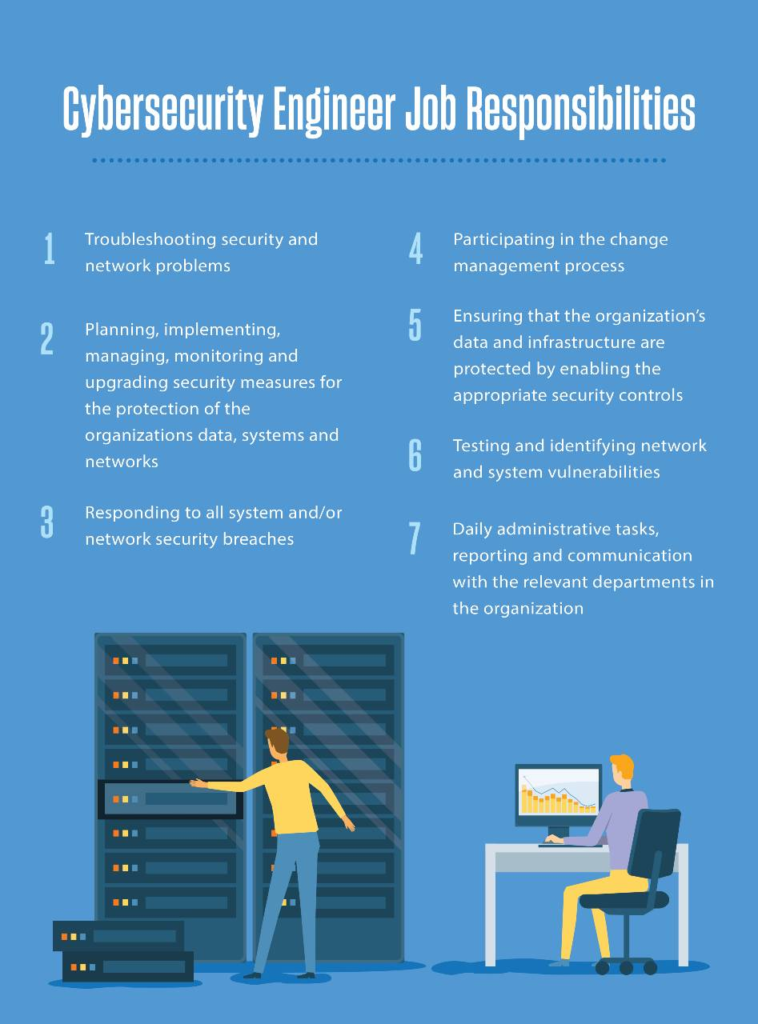

What is Cybersecurity Specialist?
A Cybersecurity Specialist is a professional who is responsible for protecting an organization’s computer networks and systems from cyber threats. They design, implement and maintain security measures to ensure that sensitive information and systems are protected against unauthorized access, theft, damage or any other form of cyber attack.
A Cybersecurity Specialist’s responsibilities include identifying and assessing vulnerabilities in an organization’s network, monitoring for unusual activity, implementing security measures such as firewalls, encryption, and access controls, and responding to security breaches or incidents. They may also conduct security audits and risk assessments to ensure compliance with regulations and industry standards.
To become a Cybersecurity Specialist, one typically needs to have a degree in computer science, information technology, or a related field. They may also need to obtain certifications such as Certified Information Systems Security Professional (CISSP), Certified Ethical Hacker (CEH), or Certified Information Security Manager (CISM) to demonstrate their expertise in the field.
Cybersecurity Specialists can work in a variety of industries, including healthcare, finance, government, and technology. They may work for consulting firms, government agencies, or private companies. The demand for Cybersecurity Specialists is expected to continue growing as the number and sophistication of cyber attacks increase, making it a challenging and rewarding career path for those interested in technology and security.
How to Become Cybersecurity Specialist?
Becoming a cybersecurity specialist requires a combination of education, experience, and technical skills. Here are some steps you can take to become a cybersecurity specialist:
- Get a degree: A degree in computer science, information technology, or cybersecurity can provide you with a strong foundation in the principles and practices of cybersecurity.
- Gain technical skills: You’ll need to have a strong understanding of computer systems, networks, and programming languages. You can gain these skills through formal education, training courses, and hands-on experience.
- Obtain certifications: Certifications can demonstrate your knowledge and expertise in specific areas of cybersecurity. Examples of certifications include CompTIA Security+, Certified Ethical Hacker (CEH), and Certified Information Systems Security Professional (CISSP).
- Get experience: Gain practical experience through internships, entry-level jobs, or volunteer work. This can help you develop your skills and build your network of contacts.
- Stay up-to-date: Cybersecurity is a rapidly evolving field, so it’s important to stay current on the latest threats, trends, and technologies. Attend conferences, read industry publications, and participate in online forums and communities.
- Network: Build relationships with other cybersecurity professionals, both online and offline. This can help you learn about new opportunities, stay up-to-date on industry trends, and find mentors who can guide you in your career.
Remember, cybersecurity is a field that requires a strong commitment to ongoing learning and professional development. By taking the time to build your skills, gain experience, and stay up-to-date, you can become a successful cybersecurity specialist.
Jobs and Salary of Cybersecurity Specialist in top Companies
| Job Title | Average Salary at Top Companies (INR) |
| Information Security Analyst | 5-10 lakhs per annum |
| Network Security Engineer | 6-12 lakhs per annum |
| Cybersecurity Consultant | 8-18 lakhs per annum |
| Security Architect | 12-25 lakhs per annum |
| Chief Information Security Officer (CISO) | 25-50 lakhs per annum |

Cybersecurity Specialist Roles and Responsibilities
Cybersecurity specialists play a critical role in protecting organizations from cyber threats. Here are some common roles and responsibilities of cybersecurity specialists:
- Identifying security risks: Cybersecurity specialists are responsible for identifying potential security risks and vulnerabilities within an organization’s systems, networks, and applications.
- Developing security policies: They develop and implement security policies and procedures to minimize the risk of cyber attacks.
- Conducting security assessments: Cybersecurity specialists perform regular security assessments to identify potential threats and vulnerabilities in an organization’s systems and applications.
- Implementing security controls: They implement and configure security controls such as firewalls, intrusion detection and prevention systems (IDPS), and data loss prevention (DLP) systems.
- Monitoring and responding to security incidents: Cybersecurity specialists monitor systems and networks for potential security incidents and respond promptly to mitigate any threats.
- Conducting security training and awareness programs: They provide security awareness training to employees and educate them on best practices for information security.
- Staying up-to-date on the latest threats and technologies: Cybersecurity specialists stay informed about the latest cyber threats and technologies, and continually update their knowledge and skills to stay ahead of potential security risks.

Cybersecurity Specialist: FAQs
Q: What is a cybersecurity specialist?
A: A cybersecurity specialist is an information security professional who specializes in protecting an organization’s systems, networks, and data from cyber threats.
Q: What skills do you need to be a cybersecurity specialist?
A: Cybersecurity specialists need a strong understanding of computer systems, networks, and programming languages. They also need skills in risk management, vulnerability assessments, incident response, and security operations.
Q: What certifications are required for a cybersecurity specialist?
A: Common certifications for cybersecurity specialists include CompTIA Security+, Certified Ethical Hacker (CEH), and Certified Information Systems Security Professional (CISSP). However, certification requirements can vary depending on the employer and the specific job role.
Q: What industries hire cybersecurity specialists?
A: Nearly every industry hires cybersecurity specialists, including healthcare, finance, government, education, and technology.
Q: What is the average salary for a cybersecurity specialist?
A: The average salary for a cybersecurity specialist varies based on factors such as location, experience, and specific job role. In India, the average salary for a cybersecurity specialist can range from 5-25 lakhs per annum, depending on the level of experience and expertise.
Q: What is the job outlook for cybersecurity specialists?
A: The job outlook for cybersecurity specialists is excellent, as the demand for cybersecurity professionals continues to grow due to the increasing number of cyber threats and the need for strong information security measures in organizations.